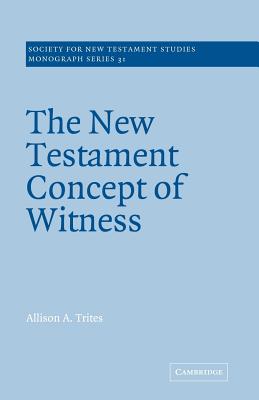Terms like 'witness' and 'testimony' occur frequently in religious contexts and have special significance there, culminating in the development of the Greek martus (witness) into the English 'martyr'. They also have a legal context, and Professor Trites examines their use in the New Testament in the light of ancient legal practice. The author argues that the idea of witness is a live metaphor in the New Testament, to be understood in terms of the Old Testament legal assembly, though the Greek lawcourts are also relevant. The witness theme is developed in a sustained way in John, Acts and Revelation, and is also used in the Synoptic Gospels, the Pastoral and General Epistles, and Hebrews. In contexts of persecution and suffering the forensic metaphors tend to be identified with military ones, but in principle they are quite distinct. Professor Trites contends that the idea of witness in relation to Christ and his gospel plays an essential part in the New Testament and in Christian faith and life generally.
| FindBook |
有 1 項符合
The New Testament Concept of Witness的圖書 |
 |
The New Testament Concept of Witness 作者:Trites 出版社:Cambridge University Press 出版日期:2004-12-23 語言:英文 規格:平裝 / 308頁 / 21.6 x 14 x 1.8 cm / 普通級 |
| 圖書館借閱 |
| 國家圖書館 | 全國圖書書目資訊網 | 國立公共資訊圖書館 | 電子書服務平台 | MetaCat 跨館整合查詢 |
| 臺北市立圖書館 | 新北市立圖書館 | 基隆市公共圖書館 | 桃園市立圖書館 | 新竹縣公共圖書館 |
| 苗栗縣立圖書館 | 臺中市立圖書館 | 彰化縣公共圖書館 | 南投縣文化局 | 雲林縣公共圖書館 |
| 嘉義縣圖書館 | 臺南市立圖書館 | 高雄市立圖書館 | 屏東縣公共圖書館 | 宜蘭縣公共圖書館 |
| 花蓮縣文化局 | 臺東縣文化處 |
|
|
圖書介紹 - 資料來源:博客來 評分:
圖書名稱:The New Testament Concept of Witness
|









